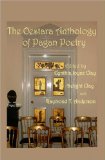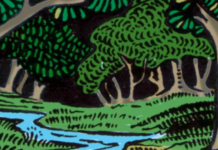
The Oestara Anthology of Pagan Poetry
, edited by Cynthia Joyce Clay, Delight Clay and Raymond T. Anderson
Oestara Publishing LLC, 127 pp. (incl. index)
According to their website, Oestara Publishing is a co-operative publishing group made up of Pagans who read, edit, and work with one another’s writing to produce Pagan books, from poetry to fiction.
A Pagan poetry contest was held, consisting of two categories, free verse and traditional form verse. Each category had cash prizes for the top three winners, though I could not find the exact dates it ran, the results were published in 2005 in this little book, The Oestara Anthology of Poetry. Other contestants, who did not win the prize money, but whose poetry was felt to be of sufficient quality, also had their work included in this anthology, winning, in effect, a chance to be published.
The introduction details each of the traditional forms used, explains the judges’ weighting system, and establishes who each of the three judges were, Cynthia Joyce Clay, Delight Clay, and Raymond T. Anderson, who also served as the anthology’s editors.
The winners of each category are given in sequence with judges’ commentary directly following each finalist’s winning entry, though the formatting of their observations could have used some adjusting.
I found with no separation between poem and judges’ remarks it broke the flow and did not allow for sufficient time to settle the reader’s own impressions, to really feel each poems worth. As a result, each of the winning poems were immediately coloured by three opinions before one’s own could be formed. I would have preferred to see the poems stand on their own merit, with judges’ commentary being an added bonus tucked away in an appendix, where a deeper look at their judging process could have been more fully formed. As it stands, it seems jagged and jarring.
Following the two sections for winners, several other contestants’ poems are showcased, with numerous poems by the same author, and lone poems, flowing into one another, arranged alphabetically by author’s surname, and also broken into two sections, Free Verse and Traditional Poetic Forms. Several of these are also quite good, and others are imperfect, but beautiful in their vibrant imagery and earnestness.
There are some truly beautiful poems here, Last Ferry, by Cis Staubach, and Banishing, by Julia Swiggum particularly, from the winning contestants.
There are others that were equally beautiful from other entrants, such as Bog Oak, by Stephen Mead, and Recognizing Kali in a Young Girl, by Adam Byrn Tritt, both found in Free Verse, which are two of my favourites.
The poems all follow Pagan themes, some invocations and charges (Charge of the God, by Julia Swiggum, who placed third in the Free Verse category, is a beautiful example of this), others on different festivals, with Samhain being a particular favourite, it seems. Others are more thoughtful, such as The Trouble with God, by Robin Renee, the last lines which run: Krishna, was it really you who said / that each man must do his duty, thus the warrior / must make war? / What did you mean by that? / And isn’t it time you found the warrior / a better job?
Afterwards, two of the judges give examples of their poems, and then each of the three follow up with brief essays of advice, further evaluations and detail their thoughts on Pagan poetry and poetry in general.
The technical aspects of the book are lacking, with inconsistent formatting, odd breaks and errors with punctuation floating throughout the text, but that aside, this is a neat little anthology, and I hope to see more on this theme.
First published on Suite101.com on 12 June 2006. (Unfortunately.)








